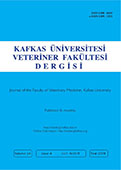
This journal is licensed under a Creative Commons Attribution-NonCommercial 4.0 International License
Kafkas Üniversitesi Veteriner Fakültesi Dergisi
2018 , Vol 24 , Issue 4
Prevalence and Molecular Characterization of Trypanosoma spp in Domestic Geese (Anser anser domesticus) from the North-East Anatolia Region of Turkey
1Faculty of Veterinary Medicine, Kafkas University, Department of Parasitology, TR-36100 Kars - TURKEY2Kars Vocational School, Kafkas University, TR-36100 Kars - TURKEY
3Faculty of Medicine, Kafkas University, Department of Microbiology, TR-36100 Kars - TURKEY
4Faculty of Health Sciences, Kafkas University, TR-36100 Kars - TURKEY DOI : 10.9775/kvfd.2018.19488 Avian Trypanosomiosis is a protozoan disease transmitted by blood-sucking arthropods belonging to the Simuliidae, Culicidae, Ceratopogonidae, Hippoboscidae, and Dermanyssidae. Trypanosoma spp. are diagnosed by using microscopic and/or molecular methods. In this study, a total of 400 domestic geese blood samples were examined using nested PCR with the primers that amplify a gene fragment of 18S rRNA of Trypanosoma spp. The molecular prevalence of Trypanosoma spp. was determined as 50.25%. 18S rRNA amplicons from the two positive isolates were sequenced with the PCR primers. The obtained sequences from the two isolates exhibited 99.7% identity to each other. Sequence and blastn analyses revealed that two isolates were highly identical (99.7-100%) to the published 18S rRNA sequences of T. thomasbancrofti, T. gallinarum and T. avium from Xanthomyza phrygia (regent honeyeater) and Gallus gallus (the red junglefowl). This study provides the first molecular data on Trypanosoma generations in poultry from Turkey. The presence of Trypanosoma spp. was also firstly identified in domestic geese (Anser anser domesticus) in the world by molecular tools and genetic characterization of a short fragment of the 18S rRNA gene region has been achieved. Keywords : Domestic geese, Kars, Molecular characterization, Trypanosoma spp.










